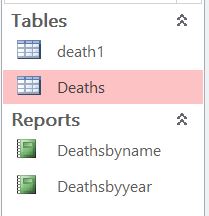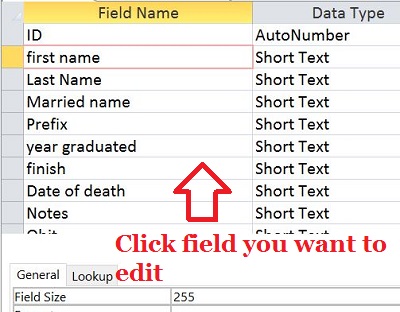Format
Microsoft Access
There is several settings you can set for a field in the database table. To see the list of options available, click here.
To access Field size, do the following
-
Open Microsoft Access
-
On the left hand side, double-click the database (in this example it is Deaths, yours will be different)
 |
-
Click Design View (click hyperlink for instructions)
-
Click the filed on top that you want to modify
 |
-
Click the right column on Format
 |
Returns a Variant (String) containing an expression formatted according to instructions contained in a format expression.
Syntax
Format( expression [, format ] [, firstdayofweek ] [, firstweekofyear ] )
The Format function syntax has these arguments:
|
Argument |
Description |
|
expression |
Required. Any valid expression. |
|
format |
Optional. A valid named or user-defined format expression. |
|
firstdayofweek |
Optional. A constant that specifies the first day of the week. |
|
firstweekofyear |
Optional. A constant that specifies the first week of the year. |
Settings
The formatargument can use a variety of settings, depending on the data type of the expression argument. Consult the articles listed in the following table for more information about valid format expressions.
|
For expressions that use this data type... |
See the article |
|
Any type |
|
|
Date/time |
|
|
Numeric |
|
|
Text and memo |
|
|
Yes/No |
The firstdayofweek argument has these settings:
|
Constant |
Value |
Description |
|
vbUseSystem |
0 |
Use NLS API setting. |
|
VbSunday |
1 |
Sunday (default) |
|
vbMonday |
2 |
Monday |
|
vbTuesday |
3 |
Tuesday |
|
vbWednesday |
4 |
Wednesday |
|
vbThursday |
5 |
Thursday |
|
vbFriday |
6 |
Friday |
|
vbSaturday |
7 |
Saturday |
The firstweekofyear argument has these settings:
|
Constant |
Value |
Description |
|
vbUseSystem |
0 |
Use NLS API setting. |
|
vbFirstJan1 |
1 |
Start with week in which January 1 occurs (default). |
|
vbFirstFourDays |
2 |
Start with the first week that has at least four days in the year. |
|
vbFirstFullWeek |
3 |
Start with the first full week of the year. |
Remarks
|
To Format |
Do This |
|
Numbers |
Use predefined named numeric formats or create user-defined numeric formats. |
|
Dates and times |
Use predefined named date/time formats or create user-defined date/time formats. |
|
Date and time serial numbers |
Use date and time formats or numeric formats. |
|
Strings |
Create your own user-defined string formats. |
If you try to format a number without specifying format, Format provides functionality similar to the Str function, although it is internationally aware. However, positive numbers formatted as strings using Format don’t include a leading space reserved for the sign of the value; those converted using Str retain the leading space.
If you are formatting a non-localized numeric string, you should use a user-defined numeric format to ensure that you get the look you want.
Note: If the Calendar property setting is Gregorian and format specifies date formatting, the supplied expression must be Gregorian. If the Visual Basic Calendar property setting is Hijri, the supplied expression must be Hijri.
If the calendar is Gregorian, the meaning of format expression symbols is unchanged. If the calendar is Hijri, all date format symbols (for example, dddd, mmmm, yyyy) have the same meaning but apply to the Hijri calendar. Format symbols remain in English; symbols that result in text display (for example, AM and PM) display the string (English or Arabic) associated with that symbol. The range of certain symbols changes when the calendar is Hijri.
|
Symbol |
Range |
|
d |
1-30 |
|
dd |
1-30 |
|
ww |
1-51 |
|
mmm |
Displays full month names (Hijri month names have no abbreviations). |
|
y |
1-355 |
|
yyyy |
100-9666 |
